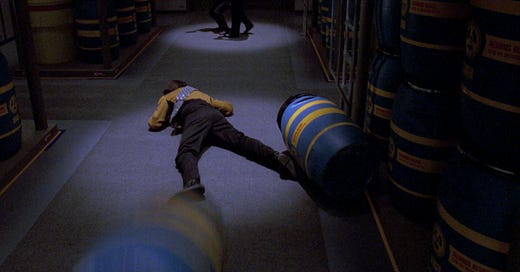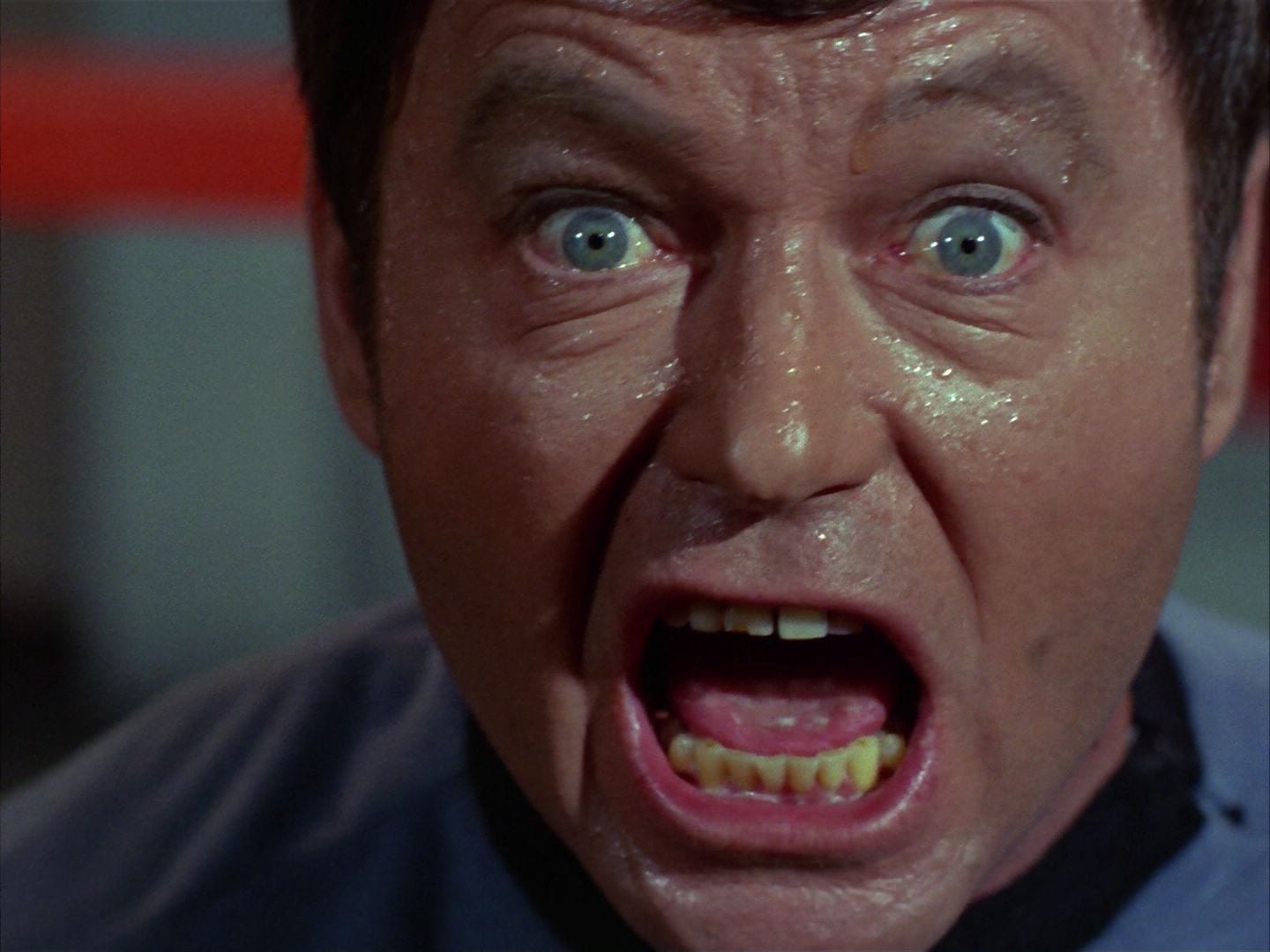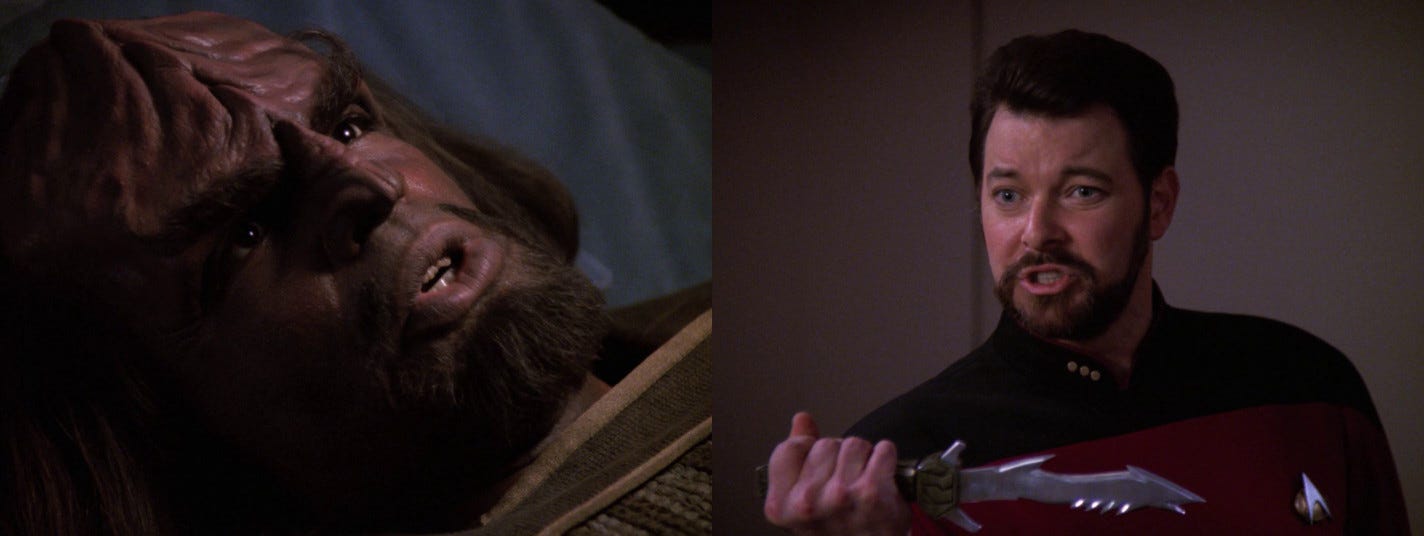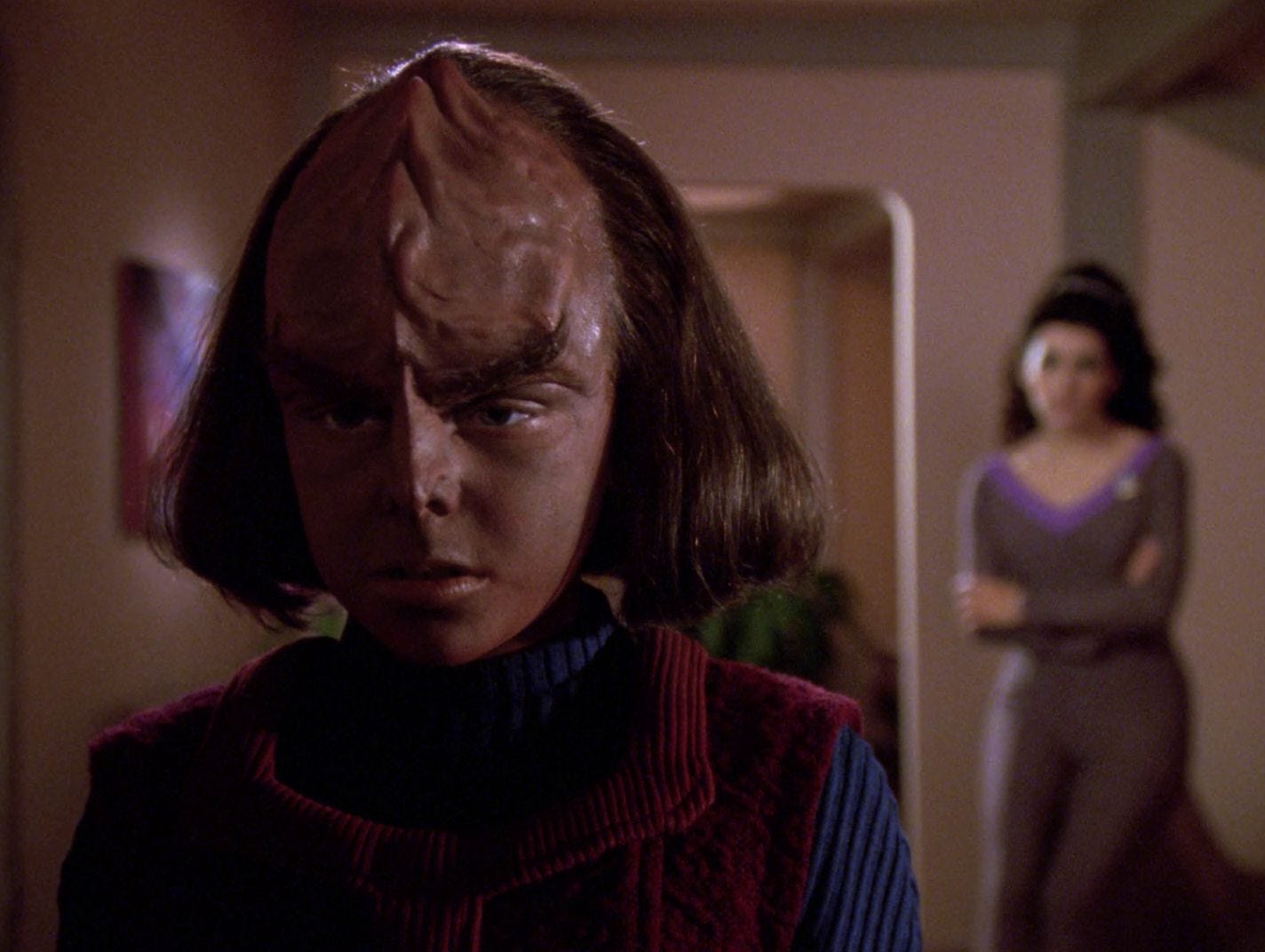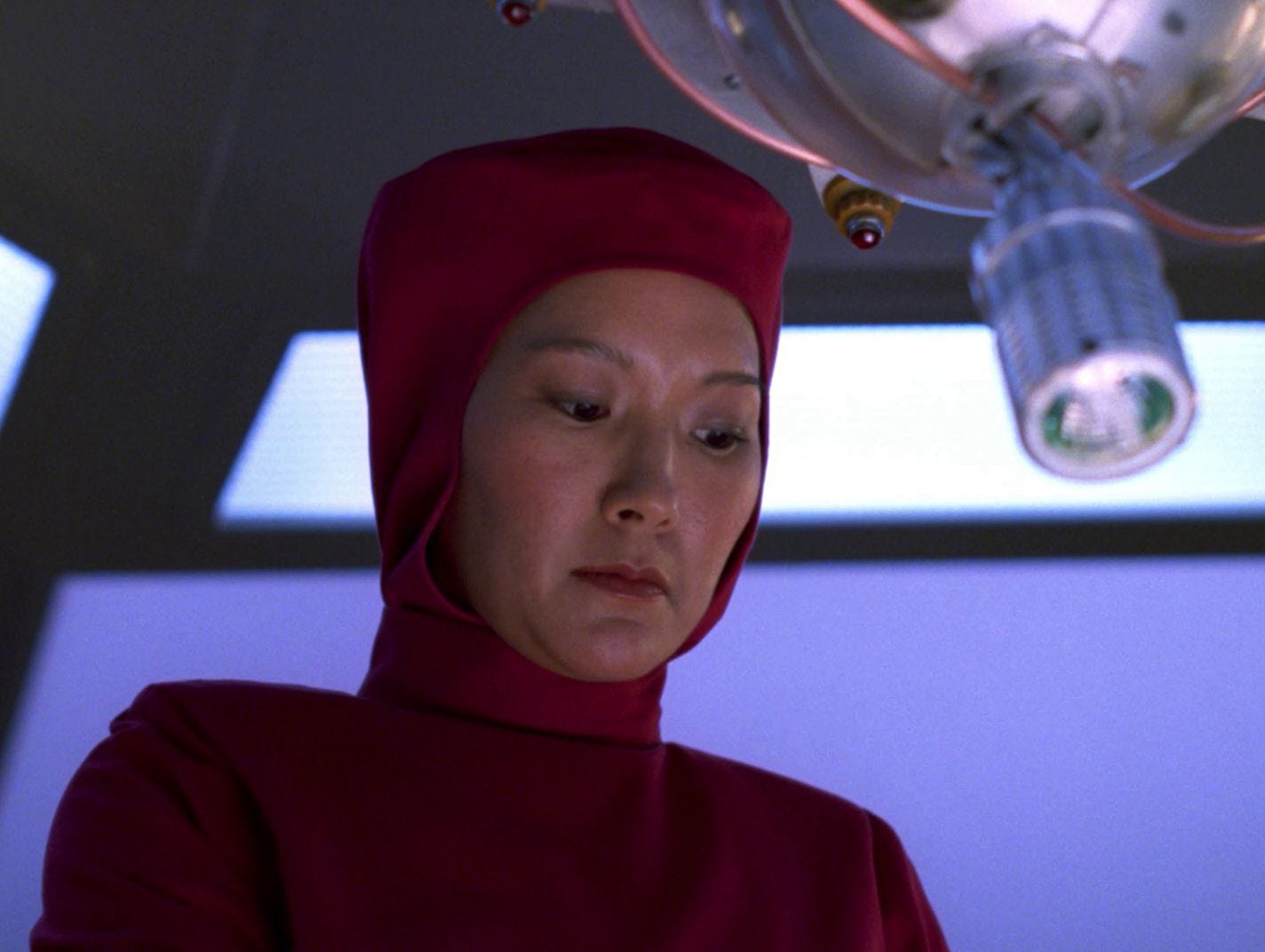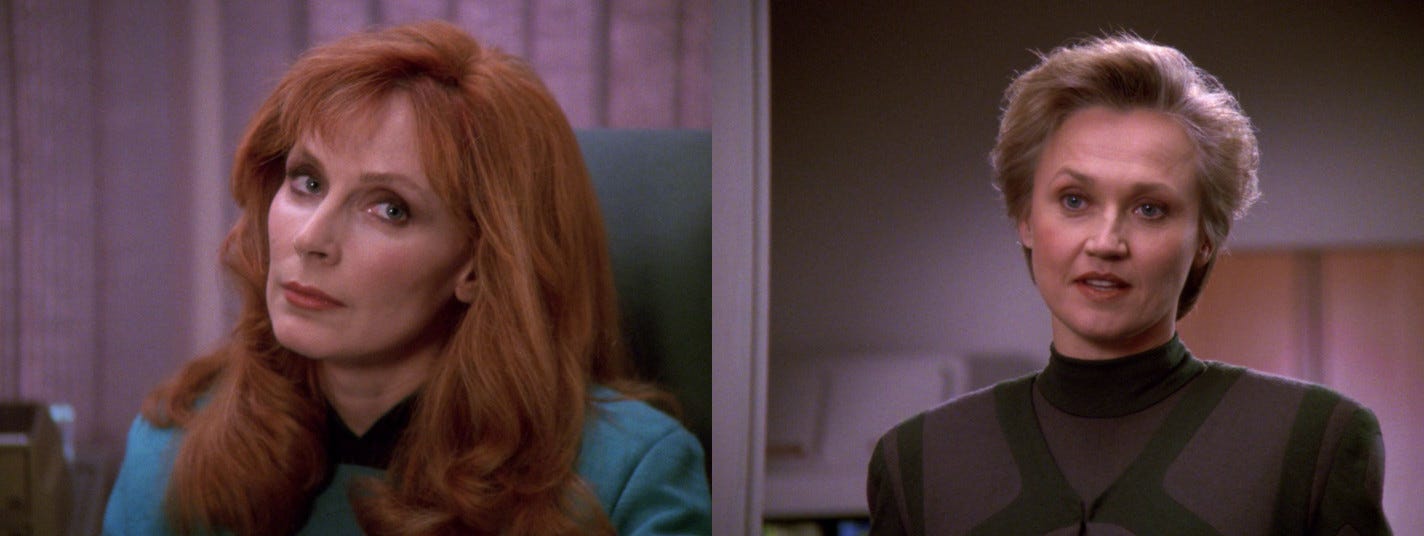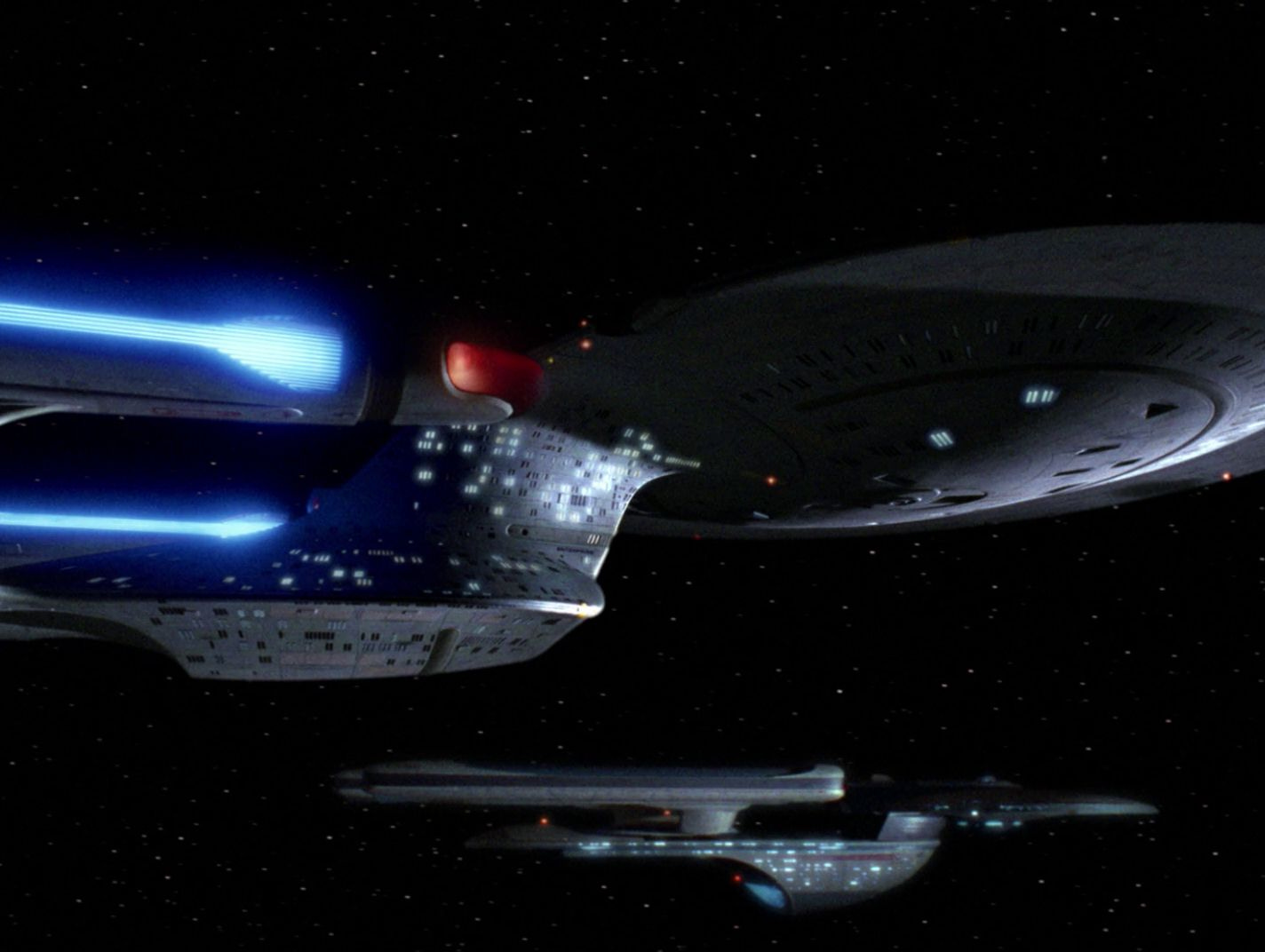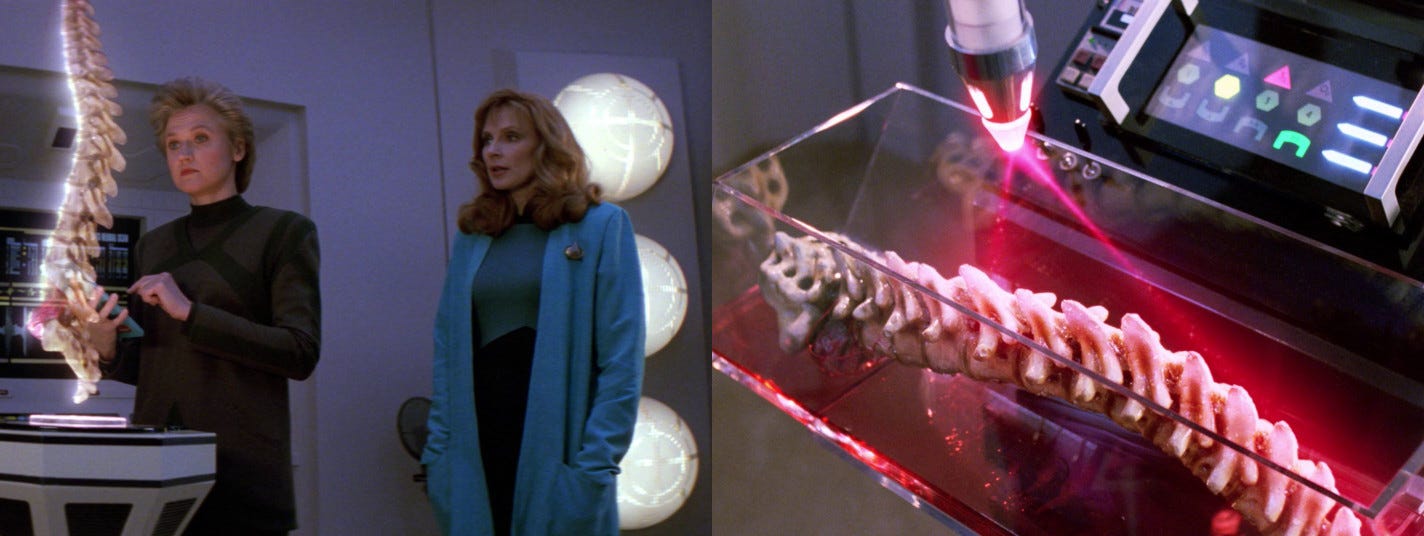It’s a Worf episode: Battle! Adventure! Honour! Well, one out of three isn’t too bad I suppose. Yes, in the middle of his best shot at finally securing a winning season, Worf is defeated by... a plastic barrel. Even on the most generous interpretation of ‘aliens and robots’, I can’t count this as a loss for him, it’s more like an implausibly epic fail. The rest of the episode is the crew and a guest star arguing about whether the best thing would be for Worf to kill himself, or for him to undergo a dangerous experimental procedure. Try to guess which happens!
Words
At the heart of this episode is the freshly invented Klingon ritual of Hegh’bat, pronounced ‘hek-bah’. Unusually, the screenplay does not contain a pronunciation guide, so as usual we’re left with Dornified Klingon, which is to say, however Michael Dorn chose to pronounce the phrase will stick forever. I’ll bet there was a chat with ultimate Trek linguist Marc Okrand in there somewhere, though. On paper, it’s an interesting way of mounting an exploration of the always-touchy subject of euthanasia... in practice, it does nothing except set up Worf to be super-stubborn, which frankly was already exceedingly well-established.
An amusing aspect of the script is that it namechecks Marla Aster (along with Tasha Yar) as a fellow crew member who was killed in action. You may recall that Worf adopted Marla Aster’s son, Jeremy, in another Ronald D. Moore episode (“The Bonding”) that also hinged upon an invented Klingon ritual, R’uustai. Perhaps Worf could ask Jeremy to perform the Hegh’bat and kill him instead of Alexander...? He is, after all, the elder son. Yeah, don’t hold your breath for that.
Then there’s ‘genetronic replication’, which is essential to the medical ethics dimension of this story. As technobabble goes, this is not unreasonable, but it’s a dreadful name that reveal’s the writer’s lack of interest in the story. ‘Gene replicants’ or ‘cellular replication’ might have worked better here, but it wouldn’t have solved the core problem of lack of care. Indeed, while Ronald D. Moore was assigned this episode to write, he had a terrible time with it, since he wasn’t a fan of medical shows and he largely tuned out in the face of the required jargon in this one, which was originally pitched by Sara and Stuart Charno (who had successfully pitched “The Wounded” and “New Ground” before this). It was their last Trek episode.
Speaking of jargon, Moore brought in his superior Trek geek-fu to invent ‘tricordrazine’, a callback to ‘cordrazine’ from the absolutely brilliant classic Trek episode “The City on the Edge of Forever”, where an overdose of the drug causes Dr McCoy to go on a temporal joyride and destroy the Federation. Fun times! And much more fun than this episode.
While some of the production team defend this episode as a success, it’s largely unpopular with fans. Director Chip Chalmers captured the positives well:
For the first time that I can remember, there have been some serious inter-personal conflicts on the ship. That’s one of the rules, nobody gets in each other’s face. We had some pretty serious conflicts, and I think that was of huge redeeming value to that particular episode, because for the first time people saw Riker and Worf yelling at each other. We also saw real tears and real emotions.
Okay, yes, I’ll accept the episode provides excuses for conflict. But this is not as important as screenwriters like to believe. They are taught that conflict is at the heart of good storytelling... but the essence of good storytelling is uncertainty, and conflict is simply a particularly powerful way of generating uncertainty. And let’s not kid ourselves: from the moment the teaser ended, my family was joking about how Worf was going to be fine by the end of the episode. No uncertainty, no drama - no matter how much conflict you draw out of the situation.
Then there’s the fact that this episode is called “Ethics”. As an ethicist myself, what do I think of this story as an exploration of moral philosophy? Well, wake me up when it’s over and we can discuss it.
Acting Roles
There’s a reasonable amount for everyone in the main cast to do this week, except weirdly LeVar Burton’s LaForge. Apart from appearing in the teaser, he’s conspicuously absent in the episode. I mean, Worf and LaForge are close friends (as shown in “The Bonding”), so this feels a little wrong to me, but the dynamics of the story mean that his presence here would be redundant. What position could he possibly take that isn’t already covered by Marina Sirtis’ Troi and Patrick Stewart’s Picard…?
However, from the main cast it’s Jonathan Frakes’ Riker who has the best material, and he delivers it brilliantly too. Every scene between him and Michael Dorn’s Worf is a corker, and easily the most enjoyable part of the episode. It’s certainly more fun than Brian Bonsall returning as Alexander Rozhenko, although even this is used well by the Riker-Worf scenes, as Riker very nearly accuses Worf of lacking the courage to ask his son to kill him. Great stuff!
Unfortunately, a large part of the episode is exchanges between Gates McFadden’s Dr Crusher and Caroline Kava’s Dr Toby Russell, with a nice side portion of the late Patti Yasutake’s Nurse Ogawa. Here she is looking concerned!
You might recognise Caroline Kava as Tom Cruise’s mother in Born on the Fourth of July, or Scott Bakula’s mother on Quantum Leap. Her career is almost all single roles (and in case you were wondering she was in an L.A. Law episode after appearing in TNG).
For whatever reason, Kava doesn’t carry the role of Dr Russell very well, and there’s not great chemistry between her and McFadden either, so all these scenes fall flat, despite being central to the episode. I rather like that Dr Crusher is such a stickler for medical research ethics, especially since in our branch of the 21st century timeline these ethics have already gone out the airlock into the cold vacuum of space. Check out this awesome Dr Crusher rant from the screenplay:
You scare me, Doctor. You risk peoples’ lives and justify it in the name of research. But genuine research takes time... sometimes a lifetime of painstaking, detailed work to get results. Not you -- you take shortcuts... right through living tissue. You put your “research” ahead of your patients, and as far as I’m concerned, that’s a violation of our most sacred trust.
Honestly, it’s really unfortunate that the structure of this story has us sympathising for Dr Russell because she saves Worf’s life with her experimental jiggery-pokery. The ethical issue here is far more troubling than this episode suggests. It has especial contemporary significance in the wake of the recent wholesale dismantling of international pharmacovigilance, thus permitting largely unaccountable corporations to perform risky experiments on entire populations of people in a manner even less ethical than Dr Russell’s. What a fun time we live in!
Models, Make-up, and Mattes
It’s a bottle show, and there’s not much to enjoy in the SFX, although let’s welcome back the once-familiar stock footage of an Excelsior class starship, here playing the USS Potemkin, which was namechecked back in “Legacy” and will be surgically inserted into Riker’s backstory in a later episode.
Other than that, enjoy the holographic Klingon spine because that’s all you're getting in terms of visuals.
Say what you like about this episode, it was at least successful at saving on the budget.


